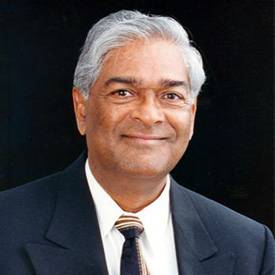World Food Prize Awarded to Wheat Breeder

Rajaram was honoured for his life-long work as a breeder of wheat, developing "an astounding 480 wheat varieties that have been released in 51 countries on six continents and have been widely adopted by small- and large-scale farmers alike".
Born near a small farming village in India, Dr. Rajaram grew up knowing first-hand the realities of a meager farming life. Though he had to travel five kilometers to go to school, he achieved an education that most of his childhood friends could not, and throughout his life he has dedicated himself to improving the lives of farmers.
During his career as a wheat breeder, Rajaram developed many important techniques, including crossing winter and spring varieties of wheat from previously isolated gene pools. The resulting new varieties produce higher yields, and show resilience to a wide range of climate conditions. Even more importantly, Dr. Rajaram has developed varieties that show resistance to wheat rust, a fungal disease that causes serious losses of yield in all wheat-growing countries, and can have devastating consequences to wheat harvests in India. In all, it is estimated that Dr. Rajaram's work has yielded an increase of more than 200 million tons of wheat to feed the world, and the legacy of his breeding work continues to benefit farmers with every new harvest.
When Sanjaya Rajaram began his career, the world's population was about half of the current number. Feeding more people, in the face of climate change and ravaging plant diseases, will be one of the greatest challenges of the 21st century. Despite corporate agribusiness continually telling us that this will be impossible without GMOs, it is refreshing to see a first-class example of traditional plant breeding that has made a real difference in combating hunger, and a world-class award that honours it.
The importance and legacy of Dr. Rajaram's work is in direct contrast to Agriculture Canada's closure of the Cereal Research Centre in Winnipeg, as reported in our recent edition of Seeds of Diversity magazine. In the same year that a wheat breeder is given the so-called "Nobel prize for food", Canada's public wheat breeders are being disbanded, and our own home-grown legacy of public wheat improvement is seemingly coming to an end.
The future of food belongs to those, like Dr. Sanjaya Rajaram, who work for the benefit of the poorest farmers, because in the long run they benefit the rest of us too.
Photo: www.worldfoodprize.org
Not yet a member?
An annual membership to Seeds of Diversity gives you access to our seed exchange, seed grow-out programs, and our online news.

We depend on donations to do our work.

Thank you for your support!
